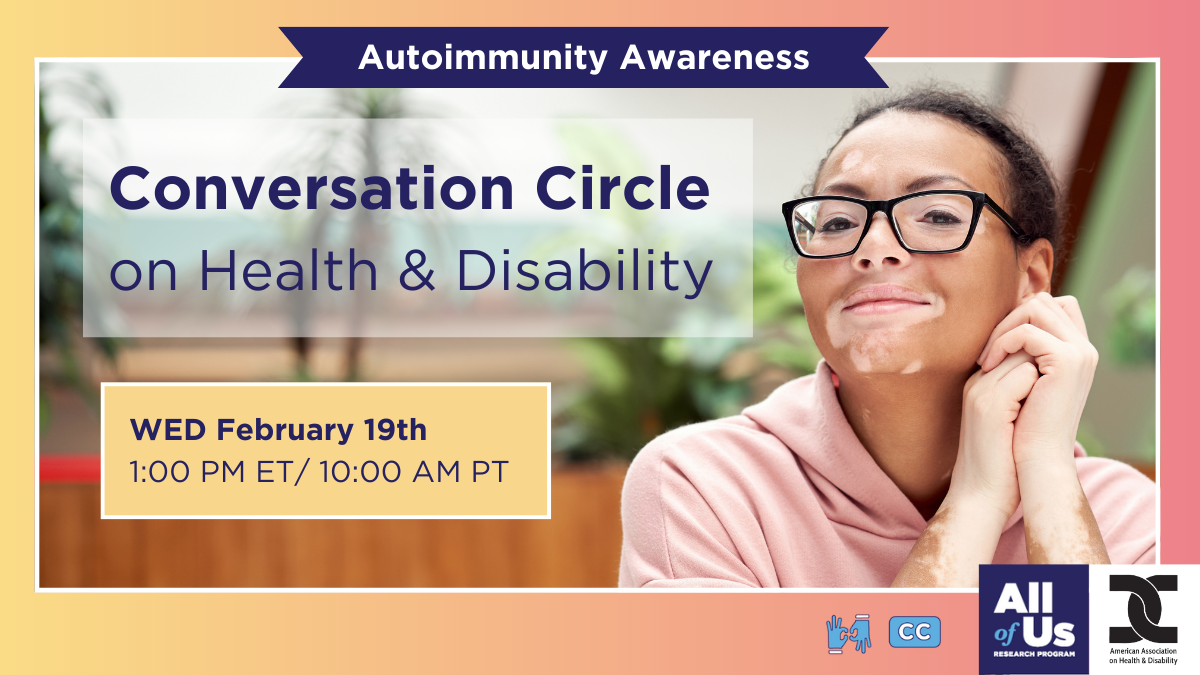This program has been postponed.
At AAHD, we are proud to partner with the National Institutes of Health’s All of Us Research Program. This program is helping to engage the disability community in health research. In 2024, we launched a new space to discuss health in the disability community. This series of Conversation Circles is a safe space for community dialogue. Members can engage in a community of learning at each gathering. They can discuss important disability and health topics that affect their lives.
So far in these spaces, we’ve talked about mental health and substance use-related recovery. The first conversation took place in September for National Recovery Month. Participants joined from across the country.
After some reflection, the group held a circle process to share their recovery experiences with peers. We asked a series of questions:
- What do you wish others understood about recovery?
- What are some of the barriers to care you have experienced?
- What does dignified, quality care look like for your health needs?
Through a series of questions, the group shared their knowledge. They also talked about some of the social factors that impact their health.
Development of the Conversation Circle Series
AAHD started the Conversation Circles to build a new place to engage community members. In a small group, trust can be built, and we can hear directly from the community about their health priorities and needs.
During the year we also offer our Disability & Health Webinar series. These panels of researchers and advocates have helped us understand the health of people with disabilities. We’ve answered many health questions from our community, but not all. Our participants are interested in ongoing discussions. So, we wanted to extend our webinars into a more community-oriented space.
With the new direct community conversations, we can learn from each other. We can also discuss some unanswered research questions. We share research being done using All of Us Research Program data related to the topic at hand. This can help to inspire participants to learn about health research on disabilities.
Recovery Month Conversation Circle – Takeaways
During the September discussion, we noted some common reflections from the group:
- It’s hard to get an accurate diagnosis. This is true for late-diagnosed autistic people and those with other conditions.
- Providers need to better understand neurodiversity, mental health, and chronic illness.
- There is a need for more understanding on the social drivers of health.
- There is a need for trauma-informed recovery programs.
- Recovery care should be built on a person’s strengths.
- Recovery is not a final endpoint. It’s a life-long process.
- Insurance changes can have a negative effect on access to care from trusted providers.
- People with dual diagnoses have unique health needs. These can include mental health and developmental disabilities. Often, services can be inaccessible for these individuals.
- Many have experienced ableist and difficult experiences with medical providers. This can negatively affect the treatment and the person’s ability to continue care.
We are planning to host our next Conversation Circle on February 19, 2025 at 1 p.m. ET / 10 a.m. PT. This will be a space to discuss our experiences with autoimmune conditions. You can watch the recording of our Autoimmunity webinar to see where the conversation started.
We do not record conversations to keep members’ conversations anonymous. This allow the circle to be a safe space for candid conversations. ASL and CART services will be provided so that all can attend.
Registration is currently on hold until we reschedule this event.
AAHD’s work with the All of Us Research Program is funded by National Institutes of Health award OT2OD031916.
All of Us, the All of Us logo, and “The Future of Health Begins with You” are service marks of the U.S. Department of Health and Human Services.
